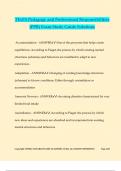Exam (elaborations)
TExES Pedagogy and Professional Responsibilities (PPR) Exam Study Guide Solutions
TExES Pedagogy and Professional Responsibilities
(PPR) Exam Study Guide Solutions
Accommodation - ANSWER-One of the processes that helps create
equilibrium. According to Piaget, the process by which existing mental
structures (schemas) and behaviors are modified to adapt to new
experiences
Ad...
[Show more]
Preview 4 out of 32 pages
Uploaded on
November 26, 2024
Number of pages
32
Written in
2024/2025
Type
Exam (elaborations)
Contains
Questions & answers
Institution
TEXES PPR
Course
TEXES PPR
$12.49
Also available in package deal from $143.99
100% satisfaction guarantee
Immediately available after payment
Both online and in PDF
No strings attached
Also available in package deal (1)
$ 344.72
$ 143.99
28 items
1. Exam (elaborations) - Texes pedagogy and professional responsibilities ec-12 (160) exam practice questions ...
2. Exam (elaborations) - Texes ppr ec-12 (160) exam study guide solutions
3. Exam (elaborations) - Texes 160: ppr ec-12 exam study guide solutions
4. Exam (elaborations) - Texes ppr (160) bloom's taxonomy study guide solutions
5. Exam (elaborations) - Texes ppr ec-12 (160) domain 1 study guide solutions
6. Exam (elaborations) - Ppr, ppr texes 160, texes ppr concepts and terms study guide solutions
7. Exam (elaborations) - Texes ppr ec-12 #160 exam questions and answers 100% pass
8. Exam (elaborations) - Texes ppr ec-12 (160) study guide solutions
9. Exam (elaborations) - Texes: pedagogy & professional responsibilities (160) - vocab/terms study guide
10. Exam (elaborations) - Ec-12 ppr (160) exam practice questions with correct answers 100% pass
11. Exam (elaborations) - Texes ppr 160: domain 3 exam study guide
12. Exam (elaborations) - Texes pedagogy and professional responsibilities (ppr) (160) practice questions - pro...
13. Exam (elaborations) - Texes pedagogy and professional responsibilities (ppr) (160) practice questions - pos...
14. Exam (elaborations) - Ppr exam ec-12 160 notes updated 2024
15. Exam (elaborations) - Ppr exam 160 study guide solutions
16. Exam (elaborations) - Ppr (160) exam sample questions with correct answers
17. Exam (elaborations) - Texes pedagogy and professional responsibilities (ppr) (160) practice questions - ins...
18. Exam (elaborations) - Texes ppr ec-12 competencies (competency 1- 13) key terms study guide solutions
19. Exam (elaborations) - Texes - ppr competency 5 key terms study guide solutions
20. Exam (elaborations) - Ppr texes exam study guide solutions
21. Exam (elaborations) - Texes ppr (160) exam practice questions with correct answers 100% pass
22. Exam (elaborations) - Texes 160 ppr exam questions and answers 100% pass
23. Exam (elaborations) - Texes pedagogy and professional responsibilities ppr (160) exam study guide solutions
24. Exam (elaborations) - Texes pedagogy and professional responsibilities (ppr) exam study guide solutions
25. Exam (elaborations) - Pedagogy and professional responsibilities ec-12 (160) study guide solutions
26. Exam (elaborations) - Texes 160 practice test 1 questions and answers 100% pass
27. Exam (elaborations) - Texes ppr (160) practice questions with correct answers
28. Exam (elaborations) - Pedagogy and professional responsibilities (ppr) 160 study guide solutions
Show more
TExES Pedagogy and Professional Responsibilities




